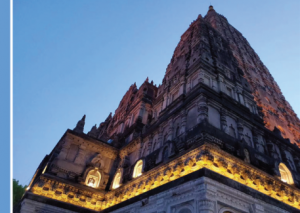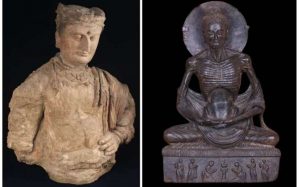
Who am I? Am I a psychotherapist, an eco-activist, or a Buddhist teacher? A sister, a daughter, or a wife? A cisgender heterosexual woman? A book lover? A dog owner? An ordinary foolish being? Am I generous or mean? Brilliant or boring? Where is my center?
With my fellow Bright Dawn students, I have just finished studying Rev. Gyomay Kubose’s book The Center Within (Stone Bridge Press, 2009). In it he proposes that our task in life is to tune into the center within us, and to act from this place. I haven’t read much about this theme from other Buddhist teachers, but it reminds me very much of the Quaker concept of a “still small voice” within. This phrase comes from the Bible (I Kings 19:12), in which Elijah hears his own inner voice: “And after the earthquake a fire . . . and after the fire a still small voice.”
One of the fruits of my spiritual life has been a closer relationship with this still small voice. I have become better at recognizing when I’m not being directed by that voice: when I feel that I must write a response to that triggering email immediately, I am not listening to the still small voice, but to a part of me that is desperate for me to have my say and defend a hurt. When I plunge from one task to the next without a pause, I am listening to the part of me that says, “Faster! Keep going! You’re falling behind!” When I am overwhelmed by despair, I am listening to the part of me that is convinced that the human race is doomed and that protects me from further disappointment by driving this home.
All of these parts of me have good intentions, but they only have one piece of the puzzle. Sometimes I have glimpses of how complex my internal system is—made up of countless parts with their own histories, agendas, and fears. They need to be flexible enough to allow me to be all of those things on that list of identities—a peace-keeping daughter, a meticulous keeper-of-accounts, a fierce eco-activist. They are often in opposition with each other—“be flexible” versus “stand up for yourself,” “watch TV” versus “read a serious Dharma book.” They are also helping to contain old shame, grief, shock, fury, and pain, which sometime threaten to bubble up and overwhelm me.
With all this going on, no wonder it’s difficult to tune into something bigger and wiser than all of that. It’s like a crowded market place, with everyone shouting at once. My apples are the best! Come and look at my gorgeous sunflowers! Everything must go! This becomes even more difficult when my system is under stress. When I’m preoccupied by my father’s ill health or a financial problem or that argument I had with my friend, it becomes even more difficult to find a quiet space to tune into a larger wisdom.
There are various things that help me to tune in. One is a regular spiritual practice. At the moment I sit for 20 minutes every morning by the Buddha image in the garden and chant nembutsu. Another is to follow Rev. Kubose’s advice and to pause completely for a minute or two between each task in my day. Another is to be as strict as I can with my schedule and to make sure I have regular spaces when I don’t plan in work or anything social. Another is to read a spiritual text, such as Zenju Earthlyn Manuel or Brother Lawrence, to remind me of those universal spiritual truths that slip so easily from my fingers. Another is to try to forgive myself when I don’t manage any of these things—to see myself through the Buddha’s eyes as a fallible being who is trying her best.
There has been some discussion in our study group about the contrast between a center within, which gives the impression of a permanent location within us, and the Buddhist concept of impermanence. Rev. Kubose has an answer to this: “Since the self is always changing, constant self-introspection is necessary. Life is finding oneself and being oneself.” (The Center Within 106) Self-reflexivity is crucial in helping me to re-discover my center. I do this by having periods of my own therapy, writing a daily journal, talking with good friends and giving myself time during walks to ponder. I find myself through seeing myself reflected in those around me, and through difficult relationships. I hate this, but the most challenging people to be around are usually my greatest teachers. I do this through writing articles like this one.
Who am I? Right now I am someone who is writing, and someone who wants to infuse these words with shared love so that you might absorb some. I am someone who is beginning to wonder about making a cup of tea. I am someone who just paused and looked out at the view from my office window, and felt gratitude welling up. What’s at my center? Right now, a deep bow. Who are you?
Related features from BDG
Beginner’s Mind: Take Action, but Do It Kindly
Buddhist Practice and Our Inner Light
Aloha and the Inner Buddha
My Journey on the Path of Won Buddhism
A Conversation with Ani Zamba, Part Three: Coming Unstuck











